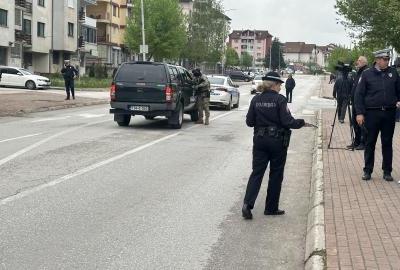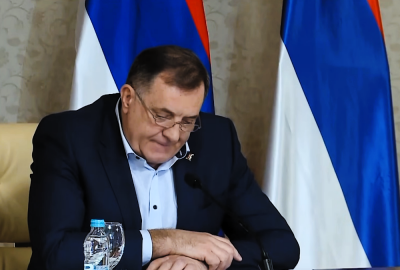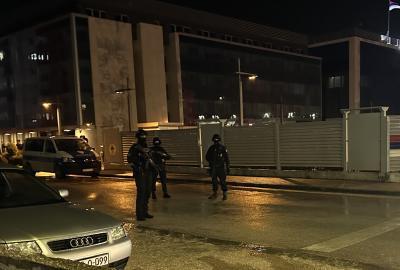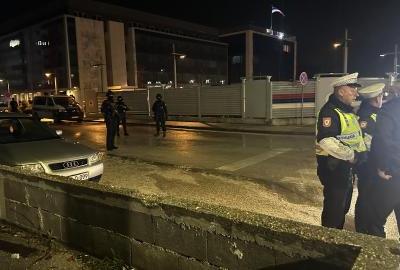Žurnal in English
CHILD ABUSE: A school example of the unification of Serbia and Republika Srpska
The defense of the endangered identity brought Dodik a luxury villa in Dedinje worth two million euros and countless lucrative jobs, he no longer knows how many of those national identities (in euros) he has in various bank accounts. As a young man, Vučić entered the first ranks of the guardian of national identity, under the leadership of the Chetnik duke Vojislav Šešelj, to eventually reach the absolute ruler of all of Serbia, and we will find out how much his job as a guardian of identity paid off only when he falls from power. These are bright examples that Serbian children should follow.

Several years ago, representatives of the authorities from Serbia and Republika Srpska loudly announced the adoption of a joint Declaration on the survival of the Serbian people. Instead of the declaration, we received a joint law on the defense and protection of the Cyrillic alphabet to the last letter, and the Day of Serbian Unity, Freedom and the National Flag, with special emphasis on unity and the flag. Although it did not experience the grace of shaping, so it remained living in the domain of fiction, in a house neither in heaven nor on Earth, the declaration, despite its uncertain ontological status, managed to bear some fruit.
As part of the declaration, it is planned to harmonize the curriculum for primary school students from Serbia and the smaller Bosnian-Herzegovinian entity. Aleksandar Vučić and Milorad Dodik, as certified experts in education and identity, ordered their subjects to unify the material in the national group of subjects which includes the Serbian language, history, geography and knowledge of nature and society. Said and done.
Last year, two manuals were published as a result of cooperation between educational institutions from Belgrade and Banja Luka, which will serve as a support to teachers to bring so-called identity lessons closer to elementary school students. The Belgrade Institute for the Advancement of Education published "Nurturing the Culture of the Serbian People and Developing National Identity", and "Preserving National Identity in Value in the Context of Primary Education" was published by the Banja Luka Republic Pedagogical Institute of Republika Srpska.
National identity as a golden hen
The representatives of education carried out the order from the highest place in full, they even slightly exceeded the norm. In the meantime, the list of subjects of national importance has expanded, science is advancing relentlessly from year to year, no one can stop scientific progress, so now the list looks like this: Serbian language and literature, history, geography, knowledge of nature and society, art culture and music education. The news about the expansion of the area of the struggle for national identity was announced by the director of the Republic Pedagogical Institute, Predrag Damjanović, at the promotion of the manual in Bijeljina.
In order not to think that education experts came up with the idea to harmonize the teaching material, Damjanović nicely explained that "two institutes realized everything that Serbian President Aleksandar Vučić and Serbian member of the BiH Presidency Milorad Dodik planned four years ago and are now moving towards further improvement of the curriculum for the remaining classes”.
It is commendable that the pedagogues from the institute on both sides of the Drina did not independently strike at the renewal and construction of the national identity in the children's heads, but were guided by the instructions of the supreme commanders of the nation. Educators did not use all the benefits of national identity, he brought them respectable positions in the industry and jobs that work for a decent salary, brought them to the middle class, but it is thousands of miles away from the mastery shown by Vučić and Dodik in using national identity like golden hens.
Class consciousness and national unconsciousness
According to the definition of endangered identity, Dodik brought a luxury villa in Dedinje worth two million euros and countless lucrative jobs, he no longer knows how many of those national identities (in euros) he has in various bank accounts. As a young man, Vučić entered the first ranks of the guardian of national identity, under the leadership of the Chetnik duke Vojislav Šešelj, to eventually reach the absolute ruler of all of Serbia, and we will find out how much his job as a guardian of identity paid off only when he falls from power. These are bright examples that Serbian children should follow.
However, the doctrine of national identity for most children predicts the fate of cannon fodder, they should give life to the homeland so that the homeland donates apartments, companies, houses, cars, villas and millions from the budget to privileged guardians of the nation. Fortunately for the children, there is no such content in the curricula, because they smell dangerously of the vicious communism that ruined the Serbs, tore them apart and separated them from the Orthodox faith, family values and submissive tradition. There is no place for class consciousness in school programs, everything is subordinated to the building of national unconsciousness in children and youth, so that tomorrow they will be obedient subjects of domestic nobles and boyars.
Obedient greats and attested patriots
It must be admitted that the authors of the manual did a good job, they covered all the general places that experts like Dodik, Vučić and thousands of similar profiteers in the nation consider national identity. Everything is there: Cyrillic, Orthodoxy, Saint Sava, Nemanjić, folk customs, fiddle, epic, patriotism, heroic songs. And there is the unquestionable dogma that national identity is one and unique, by no means plural and multi-layered, as well as the implicit message that the adoption of that famous identity can only be achieved by the Procrustean method and spiritual self-mutilation, in which children are selflessly helped by the school system as one of the key state ideological apparatuses.
Numerous authors of the manual bravely stood up for patriotism, allowing access to gentle children's spirits only to obedient greats, attested patriots. There is no place for some suspicious non-national elements, critical spirits, innovators who do not like the warmth of the herd or, far from it, for chauvinists and bearers of the spirit of self-denial. Access to such is strictly forbidden, the manuals quite aggressively suggest that a Serb must be exclusively Orthodox and strictly national, a Serb atheist, internationalist, cosmopolitan, communist or surrealist is just an oxymoron.
As we know from the dream book, Homer sometimes falls asleep, and even the authors of the manuals who worked under the watchful eye of their political masters stole a couple of somewhat suspicious guys from the history of Serbian culture. Since nationalism is primarily paranoia, as Danilo Kiš said, there is never enough caution. The program, for example, includes the song "Saint Sava" by Vojislav Ilić, which is to be commended, but it opens up many inconvenient possibilities. When children learn about the existence of this poet, it is possible that their children's natural curiosity will prompt them to further research, so they could learn various things that do not fit into the concept of a monolithic national identity.
A born poet
They might like Radomir Konstantinović's text about Vojislav, written for Krleža's "Encyclopedia of Yugoslavia", from which they would learn that the poet broke with "romantic toasting, phrasing patriotism" (as nurtured by today's manuals). They would also learn that Vojislav was a "born elegiac and meditative nature", "a poet who spent his whole life in dialogues with nothingness and death" and the originator of a technique that requires "strictness towards oneself, renunciation of hasty confession". And the worst thing is that they would find out that Vojislav was "a loner when, because of his mythological motives, they attacked him for being 'reborn', for betraying 'national soil'". Children are not stupid, it is clear to them that in a dialogue with nothingness and death, no collective identity helps, because this inevitable conversation is conducted one on one, in private.
Curious children will explore a little more, so they will find the satirical text "Contemporary Poet" by Radoje Domanović. The satirist tells an anecdote about how, together with a group of teachers, including Vojislav Ilić, he was waiting for a reception with Minister Svetozar Milosavljević in the hallway of the Ministry of Education. "The word was given to his songs. "One began to reproach him for taking motives for his songs from the lives of Greeks and Romans, and leaving unsung celebrities from our past and present who would withstand the game of old heroes in every way," Domanović writes.
The professor urged Vojislav to sing Serbian heroes, old, new, as long as they were Serbian. The poet accepted the patriotic recommendation and decided to start singing "only new, today's Serbian heroes" as soon as today. The professor cheerfully asks him who he intends to start with, and Vojislav puts his hand on his shoulder, looks at him significantly and waves his head at the minister's office, then quietly and deeply, slowly answered: "With the new Serbian hero Svetozar Milosavljević!" The professor became furious, began to scold the poet, but it was his turn to appear before the minister. An angry patriot left, and Ilić, Domanović and the others remained in the hall, laughing out loud.
A Serb in heaven
Vojislav was not only melancholic in nature, but also sherry, he was also a mockery of common places of false patriotism. And he was able to ridicule national flaws, he also had a satirical string, which students could easily discover if they read Ilić's poem "Serb in heaven". It is difficult to build any story about national identity on the following verses, and Vučić and Dodik would not be able to do that, let alone their personal pedagogues:
"One Serb died, it is not known why,
but God received him in the settlements.
And the Lord said to him, 'Oh, my dear son!
You have reached the heights of heaven.
Here are all kinds of treasures,
both educated people and good heroes.
Let not worry and sorrow suffocate you,
but feel free to seek what pleases you.'
And the Serb said to him: 'Oh my God!
I would eagerly look for newspapers, no matter what it says,
what are they doing downstairs,
What new plots are they building before the elections?'
The Lord turned to the angels one by one,
and shook his head sadly:
'Give it to him,' he said, 'and what else do we know?
That is all a Serb understands."
Something more than national
The example of Vojislav Ilić is not lonely, almost all the writers in the manuals could find works that fundamentally destroy the banal tower of national identity and established patriotism in which the guards of the nation on duty would steer the youth. Vladislav Petković Dis, Dositej Obradović, Jovan Jovanović Zmaj, Branko Ćopić, Milovan Glišić - go beyond the narrow framework of the national, local, parish, as is natural for all true creators. This is true even for Dobrica Erić, who did write various patriotic songs, defended the Cyrillic alphabet, defied NATO with "Defiant Song" and other things, but he also has a previous life in which he wrote about national heroes and Chetnik crimes.
He wrote a poem about Darinka Radović and her daughters Radmila and Stanka, from Rajkovac near Topola. They were slaughtered by Chetniks in May 1943, because they cooperated with the partisans and hid the partisan wounded in the dugout. It is not very convenient for the students to find out how the Chetniks were collaborators of the fascist occupier, butchers and murderers of innocent patriots, and that the partisans fought for freedom. The children will be confused, because the school system and the entire revisionist society teach them that the Chetniks were anti-fascists.
There is a simple antidote against the nationalist indoctrination that pedagogues carry out against primary school students at the expense of their political masters. If children are a little deeper interested in literature and culture, starting with authors who are part of the school curriculum, indoctrination will not be of much use. The more they read, the clearer it will be for students that their professors are lying to them, as well as the entire social system. Because what Predrag Čudić wrote for poetry applies to culture - it is either something more than national or it is nothing.
(zurnal.info)








